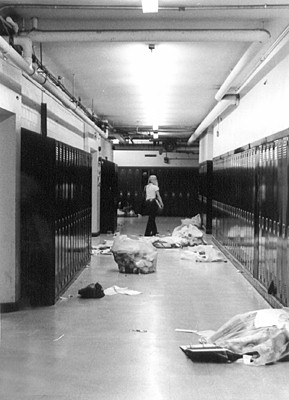All Nonfiction
- Bullying
- Books
- Academic
- Author Interviews
- Celebrity interviews
- College Articles
- College Essays
- Educator of the Year
- Heroes
- Interviews
- Memoir
- Personal Experience
- Sports
- Travel & Culture
All Opinions
- Bullying
- Current Events / Politics
- Discrimination
- Drugs / Alcohol / Smoking
- Entertainment / Celebrities
- Environment
- Love / Relationships
- Movies / Music / TV
- Pop Culture / Trends
- School / College
- Social Issues / Civics
- Spirituality / Religion
- Sports / Hobbies
All Hot Topics
- Bullying
- Community Service
- Environment
- Health
- Letters to the Editor
- Pride & Prejudice
- What Matters
- Back
Summer Guide
- Program Links
- Program Reviews
- Back
College Guide
- College Links
- College Reviews
- College Essays
- College Articles
- Back
Social Networks
While you’re away at work or school would you mind if a complete strangers walked through your home? They would look through your bedroom and look at personal photos of you, trying to learn more about you without you even knowing them personally. When you share your personal information or pictures on social networks you openly allow strangers to learn details about you that you believed you were only allowing your friends and family to see. Americans share too much on social networks making it simple for criminals or new “friends” to get to know you.
A survey shows that 78% of ex-burglars interviewed believe thieves use social networks to identify their next targets. Most likely the thieves are searching for a person that shared enough information that they can either steal the person’s identity, or mentally or physically hurt you.
Americans have become accustomed to being on social networks such as: Facebook, Instagram, Twitter, etc. and become careless. Online, people share personal information such as: health records, their love life, when their leaving home, alcohol use, and birthdays. All that information is shared but still 28% of Americans share their wall with more than just friends. Amazingly data shows that 63% of Americans haven’t even customized privacy settings on their accounts making it easy for their accounts to be hacked into or accessed by strangers or criminals.
Some may argue that their accounts are unreachable by strangers and others are so ignorant towards internet privacy that they believe it’s highly unlikely for their accounts to be hacked. Americans think that what is shared on their profile is only visible to the eyes of their friends and/or family. What they don’t understand is that there is always updates in the system that they may or may not notice, and it can change their privacy or account settings. Information that you thought was private may become open to the public such as: your phone number, birthday, location, etc.
A Harvard study found that by talking about yourself online can bring more personal relish than food or love. Online a person can be whoever they want to be. If they feel like changing who they seem to be they can just delete what they don’t like and change who they are in minutes. Americans tend to lie about who they are online to gain more followers or friends and receive more likes on a picture. People, Americans especially, care too much about other people’s opinions and their own social status. They are told that their social status depends on being pretty or ugly, rich or poor, smart or dumb. People begin to crave attention once they begin to become ‘popular’ amongst their friends or followers. They will share whatever they believe will get them likes even if it’s rude or revealing to others or themself. People forget how many others they are sharing with since they cannot physically see the crowd they are entertaining with their thoughts and opinions. To them sharing online doesn’t seem as public as speaking directly to the crowd of the same people.
When sharing online about yourself you can reveal too much in a post or picture. People, such as classmates or potential criminals, can use the given information as a form of blackmail against you. They will use what they can against you to make you their puppet. The online bullies aren’t afraid of what they are doing because they will keep the mask of their online identity and you may never find them. They make sure they are hidden behind the keys of the message board.
Not only would you be blackmailed by revealing this information but universities and colleges can use this information to their advantage. Universities have access to every account so they can find out what type of person the student is they are thinking of submitting. They like to know you outside of school since people tend to act differently around those who hold authority. Universities want to see your personality when you think nobody is watching you. They may even be able to look into deleted information.
Not only is it dangerous to sharing personal information on social networks but there are consequences to sharing also. Your safety is at risk, your privacy, your education can be jeopardized and your future can be ruined by the deceiving people that are hidden behind the screen. So do yourself a favor and stop valuing other people’s opinions and prying eyes by keeping personal information to yourself on social networks.

Similar Articles
JOIN THE DISCUSSION
This article has 0 comments.
